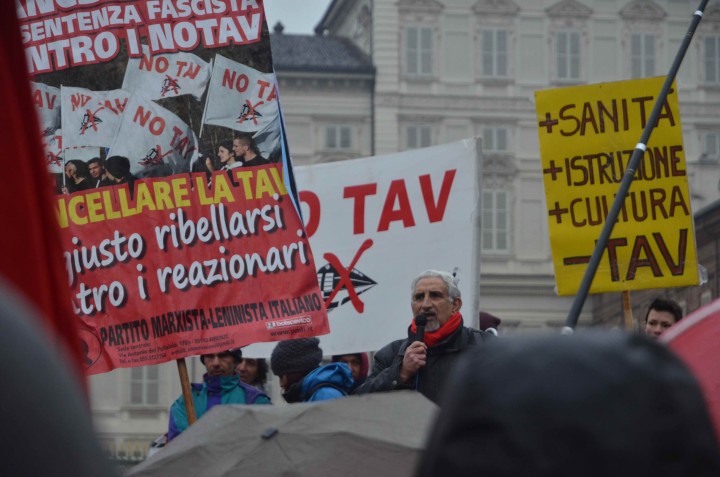Subjective responsibilities within the Mega Projects System.
On October 26th, a powerful act, political and symbolic, took place in the European Parliament promoted by European citizens struggling against Unnecessary and Imposed Mega Projects (UIMPs) and supported by many members of the Parliament.
The Decision of the Permanent Peoples’ Tribunal (PPT), regarding “Fundamental Rights, Participation of Local Communities and Mega Projects”, was announced; it is an historic judgement that condemns the entire Mega Project System within Europe and beyond.(1).
The citizens of Susa Valley had already addressed the European Parliament in 2007, delivering 32,000 signatures against the Turin-Lyon high-speed rail (TAV) project. And in 2010, after the signing of the Charter of Hendaye on January 23rd, 2010(2), which is an international manifesto on the opposition to UIMPs, citizens delivered the Charter to the European Parliament.
Today citizens in this struggle of the Forum against UIMP entered the European Parliament not only to be witnesses to this important political act, but also to tell the European Parliament that trust requires answers and courageous initiatives that have been awaited for too long.
The Parliament, the only European institution that is elected, is weak because it cannot legislate.
Nevertheless we expect this institution to work towards promoting the rights of people and their freedom of movement, placing these factors before the circulation of capital and goods, while remaining within the limits of relevant Treaties.
It is evident that the EU is gradually falling apart, at the same time it is also drifting away from its citizens. Only through rewriting Treaties will solidarity between people inside and outside of Europe be increased, rights and democracy be improved, and today’s and tomorrow’s citizens, be ensured a dignified future. Thus, the Commission’s dominance, which is responsible for the ruin of Europe, will cease.
The PPT decision doesn’t have the power to condemn those responsible for the Mega Projects System in the EU with a punitive penalty but it can recommend actions the European Institutions and Member States should pursue and points out responsibilities without expressing any historic judgement.
This text should be received with the respect due to the wisdom of its writers and it should be considered by all those who were elected by citizens to represent them in Europe and in the Member States.
The Mega Projects System in the EU is an example of Hubris, the Ancient Greek word used to define human beings’ arrogance against the gods, the same arrogance that today is directed towards the Earth and its inhabitants.
The Italian poet Andrea Zanzotto said: “Once the extermination camps filled me with horror, today I feel the same horror before the extermination of the fields”, meaning Nature’s devastation.
The Mega Projects System, which embodies an ongoing process leading to the extermination of Nature, is being preceded by the extermination of rights, carried on through the omitted application of principles “intended to guarantee full and effective citizens’ participation”.
The Judgment provided evidence that “the fundamental rights of inhabitants and local communities have been violated” and that “the responsibility for these violations must be attributed to the governments, to the promoters of the projects and the companies responsible for realizing them, to the European Union”.
But the Decision also says that within the Mega Projects System “the governments are at the service of big economic and financial interests and peoples’ opinions are ignored. This represents an extremely serious threat to the essence of the rule of law and the democratic system in the heart of Europe, which must necessarily be based on the participation and promotion of the rights, wellbeing and dignity of its people”.
The Mega Projects System incorporates an ethic of perfectionism and the pursuit of techniques glorifying efficiency for efficiency’s sake.
And the economist Serge Latouche reminds us that: “the tecno-economy is the model that best incarnates the image of progress and fully contributes to the sham of efficiency”.
He asserts that “technology contributes to the banality of evil in our age”. (3)
All this considered, we are driven to demand that those who operate and make decisions within the Mega Projects System, be they politicians, administrators, entrepreneurs, financiers or obedient bureaucrats, should take their personal responsibilities.
These people, who have different roles inside the public and private apparatus, shouldn’t consider themselves absolved by pleading that they were unwittingly swept up by the grand river of History: one day they will have to account for their own decisions in front of a Tribunal that, unlike the PPT(4), will have more than moral authority.
– Paolo Prieri, Forum against the Unnecessary Imposed Mega Projects
1 – http://www.presidioeuropa.net/blog/?p=10916
2 – http://forum-gpii.com/wp-content/uploads/2016/05/photo-hendaye-2.jpg
3 – Etica e Capitalismo, Serge Latouche – http://www.meicmarche.it/public/documenti/documento_570.pdf – http://www.edscuola.it/archivio/interlinea/latouche4.html






